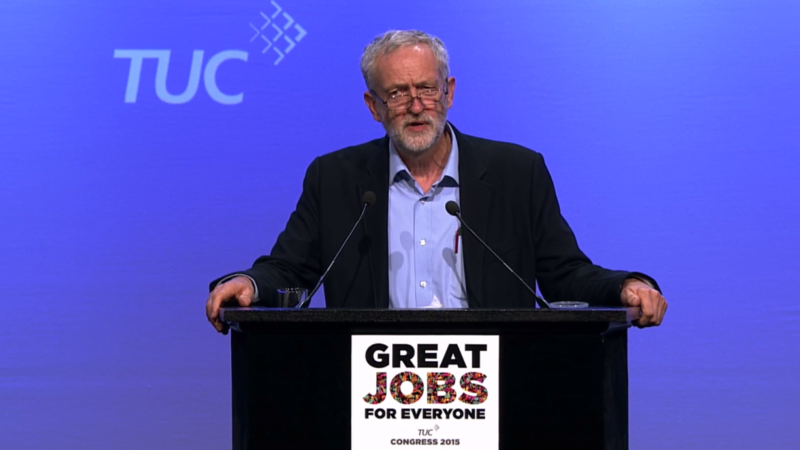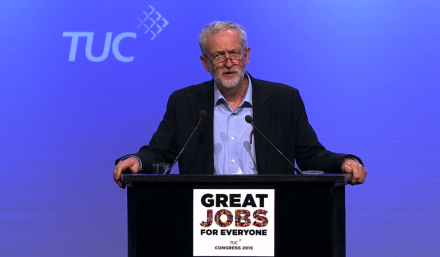

Jeremy Corbyn’s suggestion of “indicative online ballots on policy in between annual conferences” in his speech in Bristol on Saturday sounds innocuous. It isn’t.
The motivation is frustration that other stakeholders and decision making bodies in the Labour Party don’t share Jeremy’s enthusiasms for vote-losing policies like scrapping Trident. The suggested ballots are intended as a way of bullying Labour MPs by highlighting areas where they hold different views to members – a none-too-subtle way of threatening MPs that they might get deselected if they don’t fall into line. And they are a way of circumventing policy-making structures – the National Policy Forum (NPF) and Annual Conference – that are democratically elected, represent different stakeholders and interest groups in the party, and are designed to develop policy through the NPF and its Commissions in a deliberative, evidence-based and consensus-seeking way, with final sign-off and sovereignty retained by conference.
It’s understandable that the people around Jeremy would be frustrated that Annual Conference decided democratically this year in the Priority Ballot not to even debate something as divisive as Trident. It’s understandable they would be frustrated that a big majority of the 50% of conference votes held by affiliates would have been cast against unilateralism because of the long-standing policies of Unite, GMB, USDAW and Community. It’s understandable they would be frustrated that the grassroots moderate fight-back going on in CLPs – evidenced by finely balanced CLP AGMs up and down the country and moderate victories at a string of regional conferences – means that the elections of CLP delegates to Annual Conference next year won’t be the slam dunk the Hard Left had hoped for. It’s understandable they would be frustrated that the new members they recruited are not all up for moving from clicktivism to the tedium of attending actual physical meetings, interacting with other members, debating policy and voting on it in person, and that it turns out many members whilst voting for Jeremy are actually quite reasonable people and not devotees of the whole range of Hard Left personalities or policies. It’s understandable they would be frustrated that the same people who voted for Jeremy as Leader voted in the same ballot for a multilateralist Deputy Leader, a balanced NPF, and moderate representatives on the Conference Arrangements Committee.
A rational response to encountering these obstacles would be to quietly stop pushing a policy that isn’t popular with the PLP, the major unions or many activists, and that certainly isn’t popular with voters (YouGov found in September that 62% of the public oppose scrapping Trident). This would be in the interests of party unity and electability.
But instead we have the suggestion of driving a coach and horses through Labour’s rulebook and democratic structures in order to get a policy agreed that will split the party, cause frontbench resignations, and lose votes.
The suggestion of online ballots is a direct attack on the role of trade unions and other affiliates in Labour’s federal structures. They have the representation they have on the NPF and 50% of the votes at Annual Conference because they were founding organisations in the creation of the party, they are its primary funders, and because they link Labour to the real concerns of working people, which are not reflected in a membership that is both more radical and more middle class than the people who vote Labour. GMB and Unison leaders are already expressing concerns about the direction of the party – will they sit back and allow their role in policy-making to be curtailed, particularly those unions whose members’ jobs are directly affected by policy on issues like defence?
If we had a membership that was politically and demographically as good representative sample of even the people who currently vote Labour, let alone the voters we need to convince to switch to us, there might be a role for such ballots. But we have a membership that polling shows is alarmingly out-of-touch not just with public opinion but even with the views of Labour’s core voters, and that is wholly demographically unrepresentative, being top-heavy with graduates, Guardian readers and London residents. Whilst Labour’s current structures ensure there are voices in policy making for every region at the NPF and for every constituency at Annual Conference, the concentration of members in London and a handful of university towns means that nationwide online ballots wouldn’t produce outcomes that reflected national opinion, they would merely reflect received wisdom and prejudices in the areas where demography means there are huge stacks of members.
Developing the policies you mean to present to the British electorate and hope to implement in government is a serious business, particularly when it relates to life and death issues of national security.
The process of policy development requires collection and analysis of evidence and expert advice, it requires discussion and debate, trying to seek a consensus the party can unite around, it requires an understanding of what the electorate will be prepared to vote for.
None of these things will be achieved by an online ballot – it would be the snapshot aggregation of members’ prejudices about an issue, not the development of a policy worthy of that name.




More from LabourList
Economic stability for an uncertain world: Spring Statement 2026
‘Biggest investment programme in our history’: Welsh Labour commit to NHS revamp if successful in Senedd elections
James Frith and Sharon Hodgson promoted as government ministers